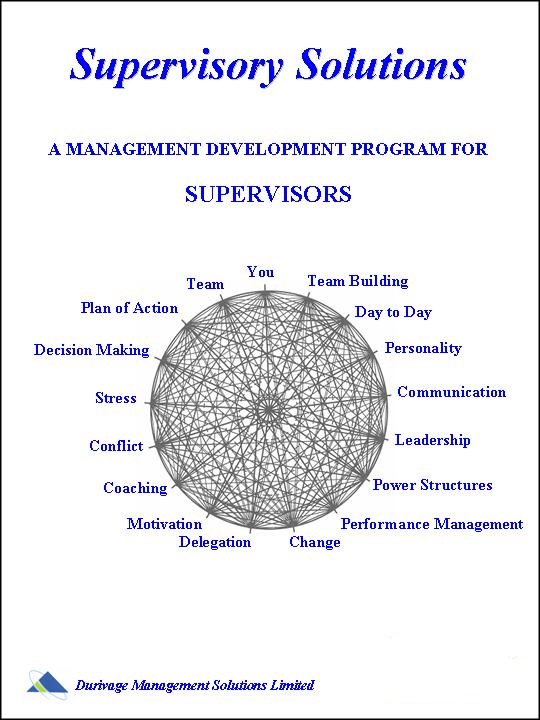


Supervisory Solutions Training |
|
|
This 6-Day program is a hands-on development curriculum for people who produce results through others: Supervisors, Managers and Project Managers. It deals with the entire spectrum of soft skills required to facilitate results effectively, efficiently and successfully. |
|

Six Day Workshop (3 2-Day or 2 3-day)
How You Will Benefit
-
Reviewing the principles of supervision into the 21st Century you will be introduced to the science and the art of working through others
-
Identifying the critical variables that affect the practice of overseeing others and we explore the optimum answers to the problems that plagues you in this role
-
Building a profile of one’s own current strengths and weaknesses in this role
-
Ensuring knowledge transfer to the workplace through the use of the Plan of Action
You Will Learn
There are 15 separate modules that come together as the basis of the knowledge and skills each person who works with and through others should possess as well as a number of sub themes:
Organizational Savvy Change
Understanding Your Role Delegation
Personality Types Motivation
Team Building Coaching
Communication Negotiation
Leadership Conflict Management
Performance Management Decision Making
Plan of Action
Course Outline
Organizational Savvy - how things get done where we work is typically based on formal and inform power structures and knowing how to influence the people and the structures. Identify the elements that would traditionally be known as the political power structure: Authority, Power and Influence
-
Review the impact of an imbalance in any one of these elements and how to rectify it when possible
-
Address how to increase one’s own power base in order to be more effective
-
Get a primer on networking
-
Learn to deal constructively with roadblocks and people who might oppose the plan
Understanding Your Role - Over time our expectations of the role of someone who oversees others and how we define success have changed. Personality - The foundations of how we work and how we get others to perform is rooted in Personality Team Building - Having individuals reporting to you should be preceded by reflection as to whether a group or team is required and setting the environment for working effectively.
Communication - Our main tool when working with others is effective Communication – the right medium, the right message, to all the salient audiences. From the written message to the blog, email to wiki, we explore 21st Century cutting edge application of tools to your work where skills like Active Listening and Feedback will be applied. Leadership - is about making it likely that the people whose support you need will follow the direction and pace you set. Performance Management - the process of managing the gap between the goals we and our team must reach and actual results along the way. Change - embrace change, your livelihood may depend on it but be aware, uncontrolled change is chaos. Change management is the controlled implementation of desired modifications. Delegation - we transfer authority and responsibility for the completion of specific activities each time we delegate yet we remaining accountable for the outcome. Here we explore how this is best done while avoiding abdication and micromanagement. Motivation - activate behaviour and orients it. Yours and theirs Teach/Mentor/Coach - The Coaching Continuum - our role as developers of people makes it essential to understand which techniques we use when and how to do each. Negotiation - coming to an agreement where we are pleased with the results, and so are the other parties, helps to ensure that the working relationship stays productive. How to make that happen is addressed here. Conflict - In the midst of challenging people to be increasingly effective we walk the line between creative tension and Conflict. Decision Making & Problem Solving - the right decision is not always an easy decision. Following the prescribed steps can help the quality of our decisions and improve the likelihood that they will get implemented. Plan of Action - Turning these concepts introduced in each of the 14 modules into skills requires action. Our Plan of Action is where we assess, reflect, and prioritize those tools/techniques that we wish to integrate into our skill set and ensure that they transfer to the work environment.
Professional Recognition
42 Professional Development Units (PDU) recognized by PMI - Project Management Institute. The PDUs can be used towards gaining and/or maintaining the designations of PMP® (Project Management Professional), CAPM® (Certified Associate Project Manager), or PgPM® (Program Management Professional).
Who Should Attend
If you want a real-world approach, fundamental skills required for successfully working with and through others, this is for you. This program is designed to help enhance Knowledge Transfer and have you benefit from the applied understanding of the skills necessary to work effectively with others.
What You Will Receive
1. A soundly researched, unabridged workbook including: Helpful recaps, Worksheets, Templates, Self-assessments, Checklists and a Personal Development Plans.
2. 42 Professional Development Units recognized by the Project Management Institute
3. Certificate of attendance
Training Options and Costs
- Enrolment fee of $2195 per participant Click here to register for this program.
- Inquire about group rates info@durivageonline.com
